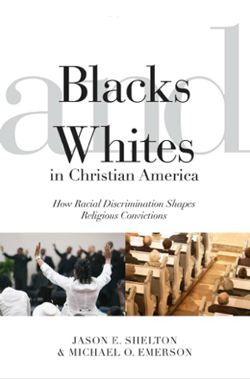Conventional wisdom holds that Christians, as members of a “universal” religion, believe more or less the same things regarding their faith. According to a new book by Rice sociologist and Kinder Institute for Urban Research Co-director Michael Emerson, this couldn’t be further from the truth.
 “Blacks and Whites in Christian America,” authored by Emerson and Jason Shelton, an assistant professor of sociology and anthropology at the University of Texas–Arlington, examines the differences between the two races when it comes to their faith through the use of empirical interviews and research.
“Blacks and Whites in Christian America,” authored by Emerson and Jason Shelton, an assistant professor of sociology and anthropology at the University of Texas–Arlington, examines the differences between the two races when it comes to their faith through the use of empirical interviews and research.
“We often hear the term ‘the black church,'” Emerson said. “We really wanted to find out, what is the black church? We wanted to know how black Protestants – who comprise 93 percent of black churchgoers – differ from their white counterparts. We wanted to see if there’s anything unique about how they practice their faith.”
Emerson said that while their research, including interviews with numerous black pastors, showed that there are “absolutely no differences” between blacks and whites when it comes to the core beliefs of Protestants (that is, the Apostles’ Creed), it revealed “stunning” differences about how the two groups go about their faith.
“At the very core, the fundamental beliefs of Christianity – that God exists, for example – black and white Protestants do not differ,” Emerson said. “But on almost everything else, even the terms they use to describe who God is, they do differ and often dramatically so.”
All of these differences were conceptualized by Emerson and Shelton into what they call the five building blocks of the black Protestant faith. The building blocks include:
♣ Experiential – Black Protestant faith is active and experiential; it is less concerned with precise doctrinal contours than is white mainline or evangelical Christianity.
♣ Survival – Their faith is critical to survival and helps individuals cope with suffering associated with everyday trials and tribulations.
♣ Mystery – Black Protestant faith is mystical and expresses an appreciation for the mystery in life; it includes folklore and cultural components driving from the African diaspora, the consequences of racial inequality in America, and non-Christian religions.
♣ Miraculous – Black Protestant faith is confident and comprehensive; the miraculous is ordinary and the ordinary is miraculous.
♣ Justice – Their faith is committed to social justice and equality for all individuals and groups in society.
Emerson noted that all of these differences remain after accounting for differences in education, income, age, gender and region of residence. These differences were found even when comparing black Protestants to the more zealous arm of white Protestantism, white evangelicals.
Emerson believes that the differences between black and white Protestants are rooted directly in the country’s history of racial discrimination.
“It’s based on personal and communal experiences,” Emerson said. “White Protestant faith has never been about survival, whereas black faith from the start has been. Slavery isn’t here anymore, but that idea of who God is has not changed for African-Americans.”
Emerson said he hopes the book will bring greater understanding to the differences in how white and black Protestants approach religion.
“Ultimately, these religious differences play a substantial role in U.S. life, from identity politics to working for racial justice and reconciliation,” Emerson said. “By going about faith differently, valuing different aspects of the Christian God and having divergent religious histories, black and white Protestants vote overwhelmingly opposite of one another, and often work against each other in efforts toward racial equity and cohesion. For real progress to be made, these groups will need to truly understand one another.”


Leave a Reply